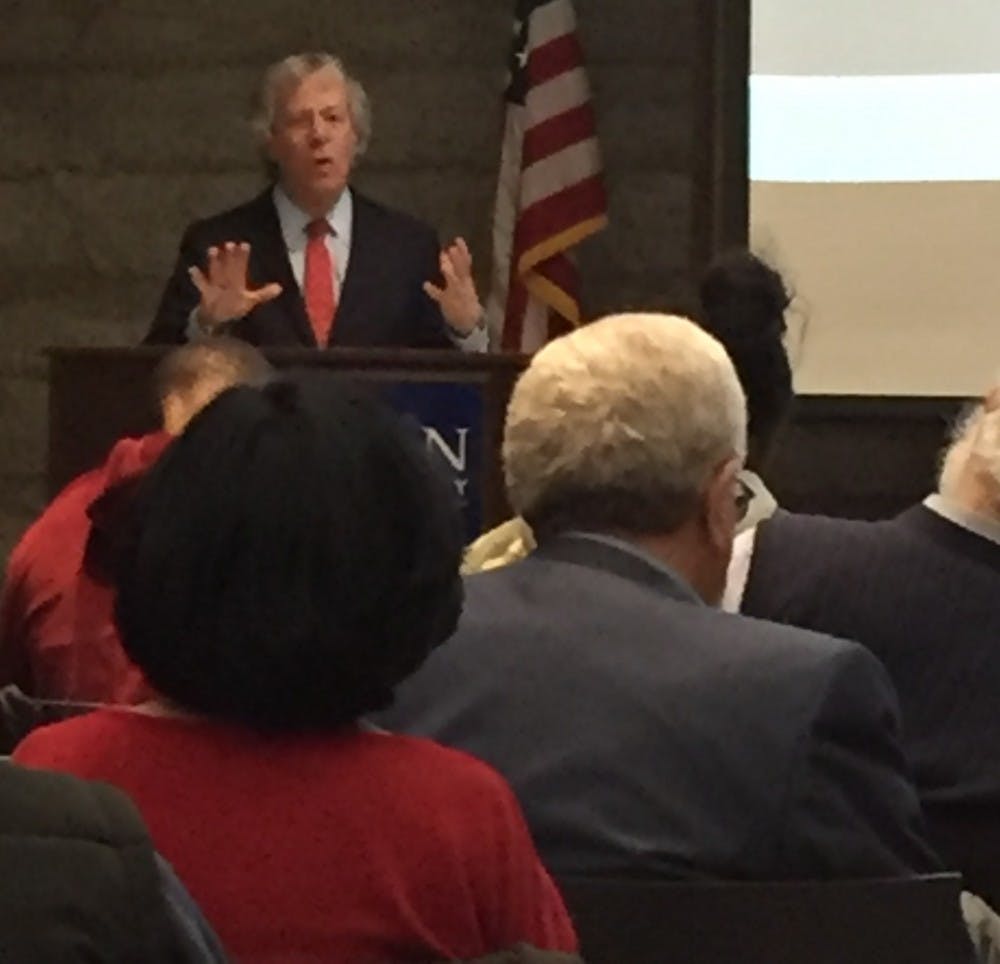Renowned Amehurst College professor Lawrence Douglas, the James J. Grosfeld Professor of Law, Jurisprudence and Social Thought at Amherst College in Amherst, Massachusetts gave an insightful lecture on the realities of historical events regarding the period of the Holocaust, and how the chronological happenings have made human rights a priority in the present day on the evening of Thursday, April 18, 2018.
Hosted by the Jewish Studies Program, the conference and student-friendly lecture took place at Kean Hall, in Room 127 and lasted from 6:30 to 9 p.m. Before the speeches began, a short reception full of treats placed on a table in the back of the lecture hall was made available for the student body and other attendees to enjoy. As the reception ended however, the stream of information began.
The lecture was opened by Dennis Klein, Ph.D., the director of Kean University's Jewish Studies Program and the Master of Arts in Holocaust and Genocide Studies. He welcomed the audience on this crisp evening to the lecture, and proclaimed his thankfulness to the audience for such a positive turnout. He then further explained the significance of the night, citing newfound learning as an incentive and the ability to have more of a perspective on certain facts about the happenings in the late 1940s that those in the lecture hall may not have known from prior history lessons.
Shortly after his introduction, he passed the podium over to Douglas. The historical expert presented a PowerPoint visual aid to the audience, with the title of the presentation large enough for all to see, as it said, "From The Sentimental Story Of The State To The Verbrecherstat," a term in German meaning "criminal state".
Furthermore, a point about the statute of limitations, or laws that forbid prosecutors from charging someone with a crime that was committed more than a specific number of years ago, which proved to be a staple in his presentation.
"I am sure a lot of you in this room know what the statute of limitations is, and the process that follows. Yet, this rapid narrowly-legal topic about the West German Statute of Limitations has very much become a topic of a passionate international debate," Douglas said.
The professor later explained in his lecture about these very statues of limitations and how, after the date of May 19, 1965, a day when an era of impunity, all German Nazi persecutions and crimes against humanity would be excused. His explanation included the likes of worldwide dissatisfaction throughout history, citing the failure of a justice system that saw the lack of accountability of all German officials during and after the time of oppression of Jewish people during the holocaust.
These very crimes against humanity, as described by Douglas, promulgated by journalists and law officials around the world to determine Nazi Germany as a "Verbrecherstat".
"The decisive point to recognize at the Nazi state, was that it was a criminal state, and not to speak of what happened now and again when a crime was committed," Douglas said.
The professor continued, "In describing the Nazi state, a phenomenon was named that, at the time, was largely unintelligible in the Western political and legal thought, which had long been convinced that of all the sentimental stories of the state, and this was the idea that the state represented the greatest protection against the disorder of the effects of violence [from the Holocaust]. Obedience to the state represented the supreme virtue of the system."
He also went on to explain the dilemma that Nazi Germany itself created, ultimately leading to their downfall. "In designating the Nazi state as the criminal state, philosophers alluded to Nazism creating this bizarre phenomenon in which the state, far from being the protector of war and the guarantor of security, and now becoming the very perpetrator of crimes," Douglas stated.
This lack of failing to see the German oppression as a crime against human rights themselves was made prevalent throughout the world, especially at the Nuremberg trials in the mid-1940s. Other points summarized by the professor mentioned these crimes against humanity and the construction of the system granting all German officials immunity from prosecution as some of the primary reasons for their incarceration and punishment, other than just their crimes of unjust genocide and persecution throughout the lengthy period of World War II.
"At the Nuremberg trials, aggression defined the most basic crime of the Verbrecherstat, and it was not just a crime against humanity, or a war crime, but simply a crime against peace, namely war of aggression," Douglas said.
Throughout the rest of the professor's lecture, the mentioning of how the term "Genocide" was created, citing the author and famous human rights activist Raphael Lemkin who coined the term to describe the Nazi treatment of Jews and other minorities. He explained that this Polish-Jewish lawyer took the Greek prefix of 'Genos' and paired it with the Latin word 'cide' to come up with this new term, called genocide.
"Genocide describes a coordinated plan of different actions aiming at the destruction of essential foundations of the life of national groups, with the aim of annihilating the groups themselves," Douglas said.
Soon after explaining the origin of the definition, the lecturer then showed on his PowerPoint presentation the official declaration of the term made by the United Nations in the year 1948. Through displaying the facts about the crimes against humanity, human rights violations and how the world collectively learned from the period of this "Verbrecherstat" to change the landscape of how international law and order is practiced for the better, Douglas thanked his audience and opened the floor for questions.
Those in attendance, composing of fans of all historical education alike, asked the lecturer about this time period and what the world chose to do, as a whole, to legally make sure that history is not repeated. Members of the student body, faculty and other members of the Kean community asked detailed and inquisitive questions during a 20-minute period. Elijah Head, a senior majoring in psychology, attended the Kean Hall lecture and internalized the message of prioritizing humanity and justice from Douglas's words.
"I am a part of a philosophy class called justice and human rights, and I thought it was really interesting to learn about the different paradigms of human injustices like what I heard today," Head mentioned. "I would love to look further into this topic to gain more knowledge for the future."
For more information on the Jewish Studies program, do not hesitate to visit their official Cougar Link page. Also, contact the program's advisor, Sara Compion at her email, scompion@kean.edu, for additional assistance.







